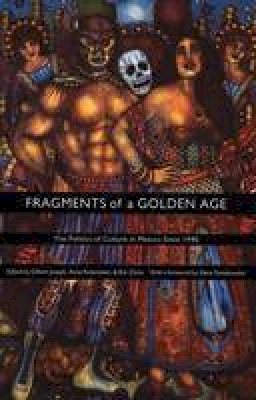
Stock image for illustration purposes only - book cover, edition or condition may vary.
Fragments of a Golden Age: The Politics of Culture in Mexico Since 1940
Joseph
€ 50.29
FREE Delivery in Ireland
Description for Fragments of a Golden Age: The Politics of Culture in Mexico Since 1940
Paperback. First cultural history of post-1940s Mexico to relate issues of representation and meaning to questions of power Editor(s): Joseph, Gilbert M.; Rubenstein, Anne; Zolov, Eric. Series: American Encounters/Global Interactions. Num Pages: 528 pages, 54 photographs, 1 figure. BIC Classification: 1KLCM; 3JJH; 3JJP; GTB; JFC. Category: (P) Professional & Vocational. Dimension: 6147 x 4039 x 31. Weight in Grams: 717.
During the twentieth century the Mexican government invested in the creation and promotion of a national culture more aggressively than any other state in the western hemisphere. Fragments of a Golden Age provides a comprehensive cultural history of the vibrant Mexico that emerged after 1940. Agreeing that the politics of culture and its production, dissemination, and reception constitute one of the keys to understanding this period of Mexican history, the volume's contributors-historians, popular writers, anthropologists, artists, and cultural critics-weigh in on a wealth of topics from music, tourism, television, and sports to theatre, unions, art, and magazines. Each essay in its own way addresses the fragmentation of a cultural consensus that prevailed during the golden age of post-revolutionary prosperity, a time when the state was still successfully bolstering its power with narratives of modernization and shared community. Combining detailed case studies-both urban and rural-with larger discussions of political, economic, and cultural phenomena, the contributors take on such topics as the golden age of Mexican cinema, the death of Pedro Infante as a political spectacle, the 1951 caravan of hunger, professional wrestling, rock music, and soap operas. Fragments of a Golden Age will fill a particular gap for students of modern Mexico, Latin American studies, cultural studies, political economy, and twentieth century history, as well as to others concerned with rethinking the cultural dimensions of nationalism, imperialism, and modernization. Contributors. Steven J. Bachelor, Quetzil E. Castaneda, Seth Fein, Alison Greene, Omar Hernandez, Jis & Trino, Gilbert M. Joseph, Heather Levi, Ruben Martinez, Emile McAnany, John Mraz, Jeffrey M. Pilcher, Elena Poniatowska, Anne Rubenstein, Alex Saragoza, Arthur Schmidt, Mary Kay Vaughan, Eric Zolov
Product Details
Publisher
Duke University Press
Format
Paperback
Publication date
2001
Series
American Encounters/Global Interactions
Condition
New
Weight
716g
Number of Pages
528
Place of Publication
North Carolina, United States
ISBN
9780822327189
SKU
V9780822327189
Shipping Time
Usually ships in 7 to 11 working days
Ref
99-1
About Joseph
Gilbert M. Joseph is Farnam Professor of History at Yale University and the coeditor of Everyday Forms of State Formation: Revolution and the Negotiation of Rule in Modern Mexico and Close Encounters of Empire: Writing the Cultural History of U.S.-Latin American Relations, both published by Duke University Press. Anne Rubenstein is Associate Professor of History, York University, Toronto and author of Bad Language, Naked Ladies, and Other Threats to the Nation, also published by Duke University Press. Eric Zolov is Associate Professor of History at the State University of New York, Stony Brook and the author of Refried Elvis: the Rise of the Mexican Counterculture and coeditor of Latin America and the United States: A Documentary History.
Reviews for Fragments of a Golden Age: The Politics of Culture in Mexico Since 1940
This marvelous book is an antidote to a generation's worth of simplifications, romantizations, and folklorizations of Mexican culture. Throughout the book the authors always take the close view, so that we become intimate with the unfolding complexities and contradictions of Mexican culture, rather than being intimidated by them. By the end, we have come to understand Mexican culture as politics, politics as art, and art as only one of the multiple acts of creation Mexicans engage in daily to interpret, embellish, and survive their own lives. This is scholarship at its best. -Alma Guillermoprieto This innovative and important book is one of the first to focus on the history of Mexico since 1940. A pioneering volume of cultural studies that will show the field how far we have come. -John Tutino, Georgetown University
